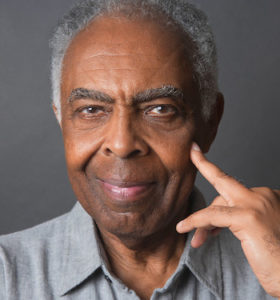
Gilberto Gil
*Gilberto Gil was born on this date in 1942. He is an Afro Brazilian singer-songwriter, politician, and activist.
Gilberto Passos Gil Moreira was born in Salvador and spent much of his childhood in Ituaçu, a small town in Bahia's countryside. His father, José Gil Moreira, was a doctor; his mother, Claudina Passos Gil Moreira, was an elementary school teacher. As a young boy, he attended a Marist Brothers school. Gil remained in Ituaçu until he was nine, returning to Salvador for secondary school. His interest in music was precocious: "When I was only two or two and a half," he recalled, "I told my mother I was going to become a musician or president of my country ."
Gil's mother was the "chief supporter" of his musical ambitions; she bought him an accordion and, when he was ten years old, sent him to music school in Salvador, which he attended for four years. Gil first played classical music as an accordionist but grew more interested in Brazil's folk and popular music. Singer and accordion player Luiz Gonzaga and songwriter Dorival Caymmi influenced him.
While in Salvador, Gil heard American big band jazz and tango. In 1950, Gil moved back to Salvador with his family. While in high school, he joined his first band, Os Desafinados ("The Out of Tunes"), playing accordion, vibraphone, and singing; the band was active for two to three years. Soon after, inspired by Brazilian musician João Gilberto, he settled on the guitar as his primary instrument and began playing bossa nova.
His political career started in 1987 when he was elected to a local post in Bahia and became the Salvador secretary of culture. In 1988, he was elected to the city council and became the city commissioner for environmental protection. However, he left the office after one term. In 1990, Gil left the Brazilian Democratic Movement Party and joined the Green Party. During this period, Gil founded the environmental protection organization Onda Azul ("Blue Wave"), which worked to protect Brazilian waters. On October 16, 2001, Gil accepted his nomination to be a Goodwill Ambassador for the United Nations Food and Agriculture Organization (F.A.O.), having promoted the organization before his appointment.
When President Luiz Lula da Silva took office in January 2003, he chose Gil as Brazil's new Minister of Culture, the second black person to serve in the country's cabinet. The appointment was controversial among political and artistic figures and the Brazilian press; Gil's remark about difficulties with his salary received criticism. Gil had not been a member of Lula's Workers' Party and had not participated in creating its cultural program. Shortly after becoming Minister, Gil began a partnership between Brazil and Creative Commons. In 2003, he gave a concert at the U.N. General Assembly to honor the victims of the bombing of the U.N. headquarters in Baghdad, playing with Secretary-General Kofi Annan.
As Minister, he sponsored a program called Culture Points, which gave grants to provide music technology and education to people living in poor areas of the country's cities. Gil also expressed interest in establishing an Internet repository of freely downloadable Brazilian music. Following Gil's appointment, the department's expenditures increased by over 50 percent. In November 2007, Gil announced resigning due to a vocal cord polyp.
Gil is a tenor but sings in the baritone or falsetto register, with lyrics or scat syllables. His songs are on subjects that range from philosophy to religion, folktales, and wordplay. As a pioneer of tropicália, influences from genres such as rock and punk have been pervasive in his recordings. Gil's interest in the blues-based music of rock pioneer Jimi Hendrix has had "significant consequences for Brazilian music ."After the height of tropicália in the 1960s, Gil became increasingly interested in black culture, particularly in the Jamaican musical genre of reggae.
Visiting Lagos, Nigeria, in 1976 for the Festival of African Culture (FESTAC), Gil met fellow musicians Fela Kuti and Stevie Wonder. He became inspired by African music and later integrated some of the styles into his recordings. One of the most famous African-influenced records was the 1977 album Refavela, which included "No Norte da Saudade" (To the North of Sadness). Conversely, his 1980s musical repertoire presented an increased development of dance trends and the previous incorporation of rock and punk. Gil has been criticized for a conflicting involvement in authentic Brazilian music and the worldwide musical arena. He has had to walk a fine line, remaining true to traditional Bahian styles and engaging with commercial markets. Listeners in Bahia have been much more accepting of his blend of music styles, while those in southeast Brazil felt at odds with it.
Gil has been married four times. He had two daughters with his first wife, Belina Aguiar. He was then married to singer Nana Caymmi; they had no children. His third wife was Sandra Gadelha, with whom he had three children. His fourth wife is Flora Giordano. The couple has three children. His religious beliefs have changed over his lifetime. Initially, he was a Christian, influenced by Eastern philosophy and religion, and later explored African spirituality. He is an agnostic. He practices yoga and is a vegetarian. Gil has been open about his beliefs "that drugs should be treated like pharmaceuticals, legalized, although under the same regulations and monitoring as medicines."